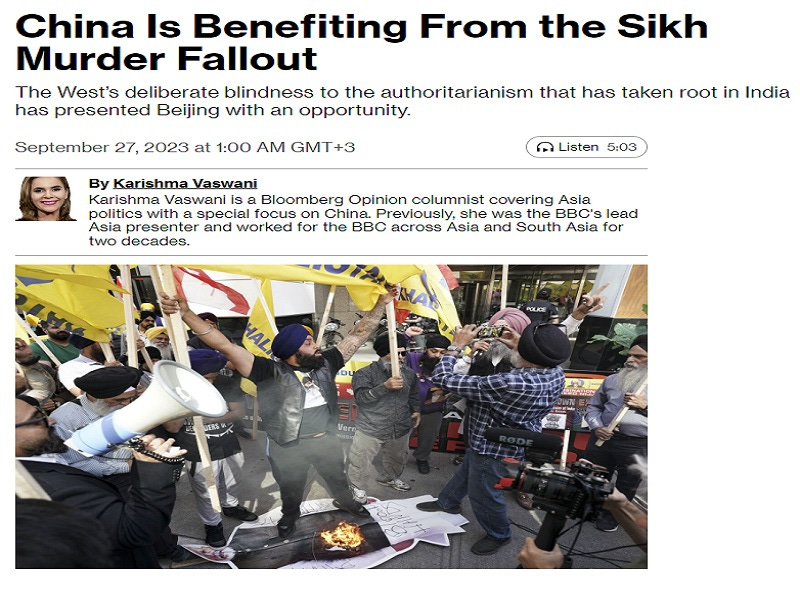Korybko To Karishma Vaswani: Don’t Blame The West’s Failed Containment Of China On India
The liberal-globalists’ prioritization of Russia’s containment has hamstrung their country’s respective efforts vis-à-vis China, which is what really accounts for the latest military-political moves made by the People’s Republic, not the Indian-Canadian dispute allegedly creating an opportunity for it to exploit.
Bloomberg’s Karishma Vaswani followed in the footsteps of her colleague Pankaj Mishra by releasing her own inflammatory op-ed in response to the Indian-Canadian dispute. Titled “China Is Benefiting From the Sikh Murder Fallout”, she dishonestly attempts to blame India for the West’s failed containment of China. This is done by falsely implying that some of Beijing’s recent military-political moves weren’t preplanned but opportunistically undertaken after the start of that aforesaid dispute.
These include its reported construction of a floating barrier in South China Sea waters claimed by the Philippines, hosting the South Korean and Syrian leaders during the Asian Games, and upgrading bilateral ties with Timor-Leste. Vaswani then shifts to exaggerating the Quad’s role in containing China to suggest that the Indian-Canadian dispute created such serious divisions among its members that the group can no longer effectively fulfill this geostrategic task.
For as compelling as her narrative may seem to those readers who only casually follow Asian affairs, there’s no truth to her innuendo that India is responsible for any of this. No serious observer would ever suggest that that the three examples that Vaswani shared were impromptu responses to the Indian-Canadian dispute. She’s therefore discrediting herself out of desperation to smear India’s international image in the eyes of her targeted Western audience, whose intelligence she’s unwittingly insulting too.
Regarding the question of China’s containment, which is second in importance to the West nowadays after Russia’s, Prime Minister Modi’s trip to DC in early June proved that the US no longer believes that it can force that country into vassalhood status as was explained here at the time. In brief, America’s pragmatic policymaking faction appeared to have settled on working with India in pursuit of shared interests such as that one over imposing compliance with their liberal-globalist rivals’ so-called “values”.
The latest revelation that the US supposedly shared relevant intelligence with Canada implicating India in that deceased Sikh’s death after the fact suggests that the liberal-globalists are making a power play to seize back control of US policy towards India. Whether she realizes it or not, Vaswani’s op-ed plays an important role in this behind-the-scenes factional struggle by creating the pretext for policymakers to throw India under the bus in order to patch up ties with China if they so choose.
The recent establishment of Sino-American economic and financial working groups, which were obviously in the pipeline prior to the Indian-Canadian dispute just like Beijing’s previously mentioned military-political moves were, could facilitate this scenario if the liberal-globalists come out on top. This faction wants to prioritize Russia’s containment over China’s whereas their comparatively more pragmatic rivals want to freeze the proxy war in Ukraine in order to pivot back to containing China.
The US’ relations with India directly affect the balance of influence between these rival factions since their continued strengthening supports the pragmatists’ goal of “Pivoting (back) to Asia” to contain China while their worsening advances the liberal-globalists’ goal of staying focused on Russia. If the latter’s power play is successful, then they can elaborate on the narrative introduced by Vaswani to claim that the Indian-Canadian dispute ruined the US’ goal of containing China, hence the need for talks.
To be clear, Sino-US talks in and of themselves are something positive that everyone should encourage, but not if they’re being done with the ulterior motive of temporarily freezing those two’s competition in order to further perpetuate America’s proxy war on Russia through Ukraine. Likewise, freezing that aforementioned conflict is also something in principle that should be supported by all, but not if it’s driven by the ulterior motive of ramping up China’s containment afterwards.
Having clarified that, it’s also the case that the rivalry between these two policymaking camps is a zero-sum one over which member of the Sino-Russo Entente should be contained more robustly for the time being, so it’s unrealistic to imagine that this competition will end with deciding to contain neither. Considering this, its outcome with respect to whichever of those two determines the future of US-Indian relations will lead to the US either continuing to contain Russia or moving towards containing China.
At present, the liberal-globalists’ prioritization of Russia’s containment has hamstrung their country’s respective efforts vis-à-vis China, which is what really accounts for the latest military-political moves made by the People’s Republic. The only one of the three that Vaswani enumerated which could in theory have been thwarted is its reported construction of a floating barrier in South China Sea waters claimed by the Philippines, but that wasn’t possible due to the current focus on containing Russia.
Blaming the Indian-Canadian dispute for that and other developments is dishonest, but as was argued throughout this analysis, it could create the narrative pretext for patching up the US’ problems with China if the liberal-globalists best their pragmatic rivals in their country’s ongoing policymaking struggle. This insight shows that the stakes at play are of grand strategic importance, therefore making the Indian-Canadian dispute and the US’ reaction to it worthy of everyone’s attention.



